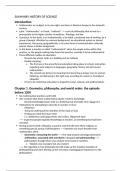Samenvatting
Summary History of Science Chapter 1-9 + Epilogue
- Instelling
- Vrije Universiteit Amsterdam (VU)
This is a summary of the book of Mathematical Worlds written by Danny Beckers. The summary contains all the highlights of the book including thoughts about certain events and notes from the lectures. Every chapter is clearly stated with subtitles, important people from that time and a little summar...
[Meer zien]




